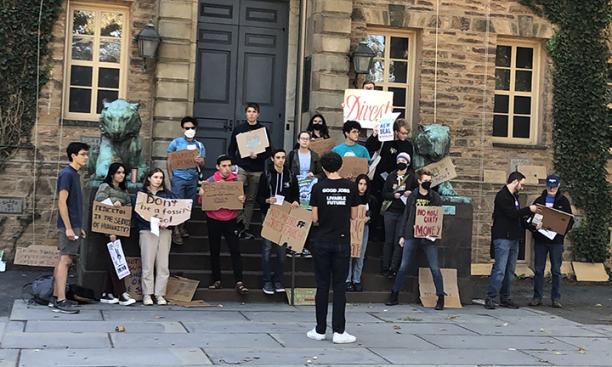
When Princeton announced it was divesting from fossil-fuel stocks and dissociating from some of the industry’s worst polluters — a move that was years in the making — many students, faculty, and activists celebrated the news.
“Princeton’s dissociation decision is the culmination of an unusually thoughtful, transparent, and deliberative process,” Dean for Research Pablo Debenedetti told PAW via email.
The Board of Trustees voted in September to divest the endowment from all publicly traded fossil-fuel companies and dissociate from 90 fossil-fuel companies, including Exxon Mobil and Dominion Energy, that are active in the thermal-coal or tar-sands business. (The full list is available at fossilfueldissociation.princeton.edu.)
The steps come more than seven years after the Princeton Sustainable Investment Initiative submitted a proposal calling for the University to divest from coal companies and eventually end its investment in other fossil fuels. Divest Princeton, a group of students and alumni, revived the effort with a proposal to the Council of the Princeton University Community (CPUC) in 2020.
The CPUC’s review eventually led to the board announcing in May 2021 its intention to dissociate from, or cut all business ties with, companies engaged in climate disinformation and those that participate in the thermal-coal and tar-sands segments of the industry. The move was finalized this September, though the trustees determined that no companies currently meet the “exceedingly high” bar for dissociation based on disinformation practices.
According to a University announcement, the board has committed to “a net-zero endowment portfolio.” The Princeton University Investment Company (Princo) will eliminate its fossil-fuel holdings and “ensure that the endowment does not benefit from any future exposure to those companies.”
“The actions taken by the University and the Board of Trustees are a huge step towards the full divestment and dissociation from fossil fuels,” Divest Princeton co-coordinators Nate Howard ’25 and Aaron Serianni ’25 told PAW by email. “This decision is the result of a decade of activism by Princeton students, faculty, staff, and alumni.”
“This decision is the result of a decade of activism by Princeton students, faculty, staff, and alumni.” — Divest Princeton co-coordinators Nate Howard ’25 and Aaron Serianni ’25
In March, Princeton announced — for the first time — dollar figures that detailed the University’s investments in fossil fuels: a total exposure of about $1.7 billion, or 4.5 percent of the endowment. The University’s Faculty Panel on Dissociation Metrics, Principles, and Standards issued a report in May that recommended criteria for dissociation. Minor revisions were incorporated from an administrative committee — which included Debenedetti — before it was passed on to the board, but the board was not required to adhere to it.
Members of the faculty panel told PAW via email that they were pleased to hear about the trustees’ vote.
Professor Michael Oppenheimer, a member of the faculty panel, said it was “a major step forward for Princeton and for corporate accountability.” Though he felt the decision left “undone” one key aspect, sanctions against companies that propagate disinformation, he also said that “the policy is a work in progress … and can point the way for other universities as well as Princeton.”
Anu Ramaswami, chair of the faculty panel, said she agrees with the trustees’ decision not to take action against those engaging in climate-disinformation at this time, and that the vote “opens up new frontiers in higher education’s efforts to advance sustainability.”
Author and activist Bill McKibben was among the environmentalists who applauded the news on social media. “Truthfully, Princeton took an awfully long time to grapple with this most important of issues, but I was happy to see them divest, and actually impressed to see them looking at the consequences of funding relationships with big oil, which breaks some new ground,” he said in an email to PAW. “Above all, it made me very happy to be able to say that Exxon no longer had that tiger in its tank.”
In 2020, Exxon Mobil renewed a partnership agreement with the Andlinger Center that is scheduled to run through 2025. The University said it will create a fund to offset research resources lost because of dissociation.
Princeton is currently communicating with the identified companies, and in its announcement noted that “if a company provides information in a timely manner that resolves the concerns or demonstrates changed behavior moving forward, it could be exempt from dissociation and removed from the list.”
It is unclear exactly when Princeton plans to dissociate.
“We’re grateful to the Princeton faculty members who dedicated their time and expertise to addressing an important and challenging set of questions,” Board Chair Weezie Sams ’79 said in Princeton’s announcement. “It is thanks to their work, and the engagement of many members of the University community, that we’re able to take these steps today.”
When the University revealed its fossil-fuel holdings earlier this year, about $13 million, or 0.03 percent of Princeton’s endowment, was held directly in fossil-fuel investments, while the rest of the exposure was held indirectly (for example, through external managers). At that time, the University’s endowment did not include any companies that derived more than 15 percent of revenue from tar sands, while about $19 million came from companies that derived more than 15 percent of revenue from thermal coal.
